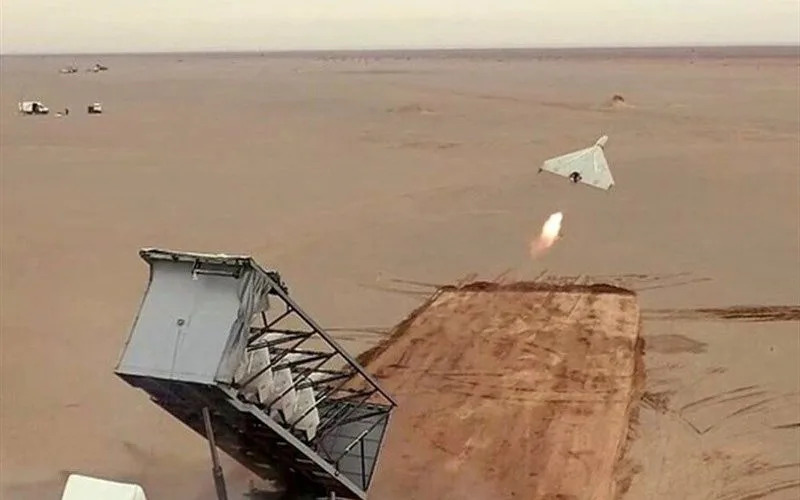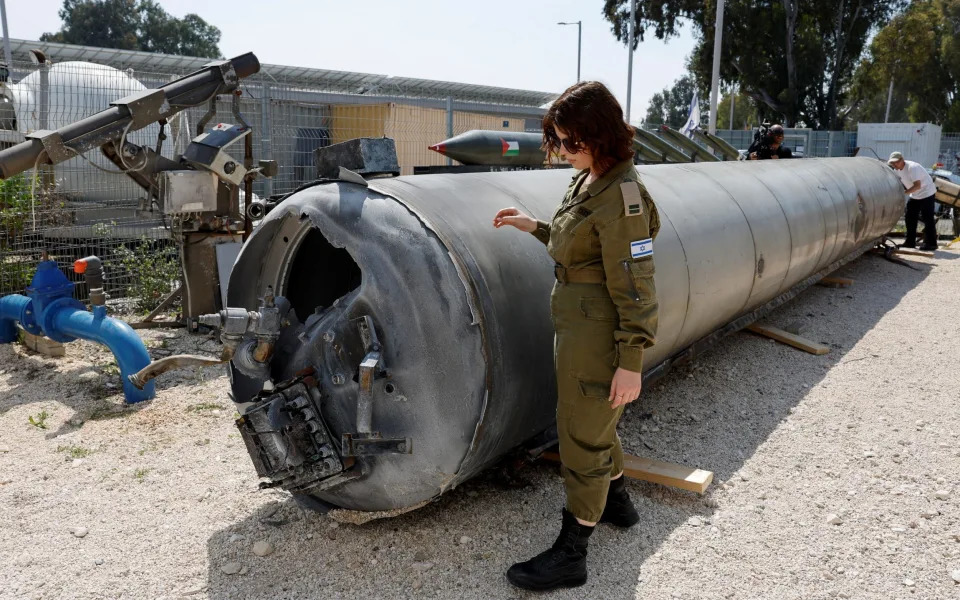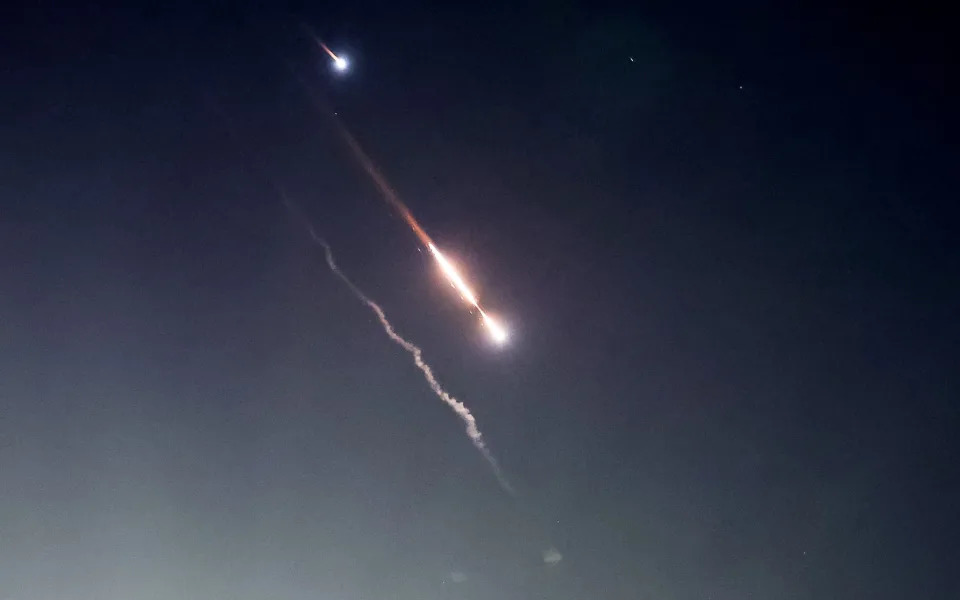An Israeli reservist fighter pilot said it was like “Top Gun meets Star Wars” as he described how he shot down Iranian missiles and was back at work in his office before the end of the day.
The pilot, identified as “Major G”, said that taking to the skies to defend Israel from more than 350 missiles and drones was “the most complex mission of my life”.
“It really was a different thing with hundreds of those UAVs and missiles in the air getting intercepted around you, like Top Gun meets Star Wars, endless explosions and interceptions going on around you,” he told The Telegraph.
“It was the most complicated mission I’ve done in 20 years in the air force, knowing that if there is a missed target, maybe it blows up in Israel,” he said.
“We flew in an amazing coalition with the US, UK and other forces and on the one hand it was a very aggressive attack co-ordinated by Iran, one which maybe we haven’t seen in modern warfare, but you’re seeing absolute defence in action.”

The US, UK, France and Jordan all helped Israel thwart the onslaught, with RAF Typhoons shooting down several targets and helping allied pilots track others as they sped towards Israel.
Iran claims the barrage was a response to a suspected Israeli air strike earlier this month on the Iranian consulate in Damascus that killed a top Islamic Revolutionary Guard Corps commander and several other officers. Israel has not claimed responsibility for the attack amidst a years-long shadow war between the two countries.
With more than 3,000 hours of flying time, Major G was well-prepared for night missions. But hunting low-flying cruise missiles puts pilots in serious danger.
“It’s always harder to find and take down these targets in the night. They’re flying really low and so you fly low too but you’re unable to see the ground,” he said.
“You rely on sensors, but at some points it’s really close. You’re seeing street lights or other things on the ground very close to you and it’s a very uncomfortable feeling. But we’re well trained for that and we’ve proven this time that we know how to get the job done.”
Major G was at home with his wife and children when the call came to scramble.
“They are already familiar with the situation when you get the call and grab the bag that’s always ready in the closet and you leave at a moment’s notice. It happens every now and then, but nothing as extreme as last Saturday.”

A lawyer by day, by 4pm Sunday, the reservist was back in the office “shooting off emails” as opposed to shooting down missiles. Like the others in his squadron, who are the likes of engineers and teachers, it is a complex double life they lead. “I took a shower, went to sleep for a few hours, woke up, had a great breakfast and went back to work,” he said, back at the office by 4pm.
“It’s a complicated transition but you learn how to do it as you go by. One minute you’re shooting down drones somewhere in the Middle East, risking your life, barely making it, with this huge responsibility on missions important for the entire country and people, then you go back to your day-to-day chores, you get the kids ready for school, take them to daycare, people harass you at work with their tasks which are important, but you have to get used to that diving in and out of that operational world,” he said.
In the last six months of war, triggered by Hamas’s attack on Israel on Oct 7, there have been many aerial missions but none as significant – or dangerous – as this.
“Here it was a whole battlefield, you see the ballistic missiles in the sky getting blown up, the fireballs as a target gets blown up, you’re flying low altitude at night, then when you fire your own missile blowing up that target right on your nose, that’s a pretty incredible frame to look at,” he recalled.

“It’s dark so you can’t see a lot but it’s in your radar lock. It’s very noisy as the missile flies out and you see it burn in the sky. It takes a second and a half until it hits and it’s like slow motion and you focus on making sure it hits the target. You see a huge fireball and you try to sidestep it so you don’t hit it.”
Major G and his wingman shot down two targets and in formation with his squadron shot a combination of drones and cruise missiles.
He said this mission was about being the “hunters”. “It’s not the situation where you get fired at as well which we’ve also dealt with. The main risk wasn’t losing the planes but missing the targets and having that hit in Tel Aviv or Jerusalem, or another strategic target in Israel. There is no second chance. We couldn’t say for sure we’d get all of them but happily we did.”
The outcome “exceeded expectations”, he told The Telegraph. “Intercepting cruise missiles or UAVs flying at low altitude at night is probably one of the most challenging missions you can try to accomplish.
“It requires finding them which is very challenging but getting into position is very hard, without hitting the ground, hitting other planes, without risking your own plane. I’m not sure other air forces could’ve performed that. You’re really taking yourself to the edge.”
Now a national hero, he says his work is simply “very important for Israel in general”. And this mission was different from all others.
“I came back home early in the morning Sunday and typically you can’t talk about what you’ve done but this was all over the news and I saw the pride in my wife’s eyes. She felt safer than the night before so knowing you make a difference in people’s lives and make them safer in their own homes is the reason we do this.”
It could have ended very differently. “These missiles and UAVs, ballistics, flying into Israel were meant to come here. Some had half a ton of explosives. You could see where they were headed and how they were travelling. These weren’t aiming to hit outside the border.”
As the world awaits what comes next, he admits he is “very happy I’m not the one who has to take the decision” though he is on standby at all times. “We are all hoping for a peaceful solution in the end.”
The US says it won't shoot down drones over Ukraine, despite doing the same to protect Israel
-
The US helped shoot down Iranian drones and missiles fired at Israel over the weekend.
-
Ukraine's president said the response showed what could be done to protect his own country.
-
But the White House said it wouldn't do the same for Ukraine, calling it a "different threat picture."
The White House said on Monday that it would not shoot down drones for Ukraine, despite having done so for Israel over the weekend.
Israel said that Iran fired more than 300 drones and missiles at it on Saturday night. The US, UK, France, and Jordan said they helped to stop the barrage, including through the use of aircraft.
White House National Security Council spokesperson John Kirby was asked in a media briefing if the US could also help to shoot down drones over Ukraine.
Kirby responded: "I knew this question was coming too. Look, different conflicts. Different conflicts, different airspace, different threat picture."
He said that President Joe Biden "has been clear since the beginning of the conflict in Ukraine, the United States is not gonna be involved in that conflict in a combat role, and we haven't."

Russia has been firing drones and missiles across Ukraine as part of its full-scale invasion, often hitting and destroying energy infrastructure, as well as residential buildings, and killing civilians.
Ukrainian President Volodymyr Zelenskyy said the response to Iran's aerial attack on Israel "demonstrated how truly effective unity in defending against terror can be when it is based on sufficient political will."
"Together, they prevented terror from prevailing," he added. "And they are working together, and in coordination with others, to prevent further escalation."
Zelenskyy said that similar actions should be taken to protect Ukraine.
Many of Ukraine's allies, including the US, have said they are trying to help without escalating the conflict with Russia. But some world leaders have rebuffed this, saying Russia will escalate the war either way.
Zelenskyy said the response to the attack on Israel also showed that NATO members can protect non-member states, and could protect Ukraine, which is not part of the military alliance, in the same way.
"Israel is not a NATO member, so no action, such as triggering Article 5, was required," he said, referring to the alliance's collective defense clause.
"No one was dragged into the war," Zelenskyy added. "They simply contributed to the protection of human life."

Zelenskyy went on to say that "European skies could have received the same level of protection long ago if Ukraine had received similar full support from its partners in intercepting drones and missiles."
Ukraine is running critically low on air defense missiles, which means Russia's attacks are more likely to get through.
Republicans in Congress have stalled further aid for Ukraine over the past six months, preventing any new supplies coming from the US.
Kirby said the US had previously given Ukraine "the tools that they need to help defend their space. And unfortunately, we can't do that right now, because we don't have the National Security Supplemental funding that they so desperately need."
Experts previously told BI that Ukrainian shortages would likely allow Russia's air force to fly freely, which could have effects so devastating that it could bring about a quick end to the war.


